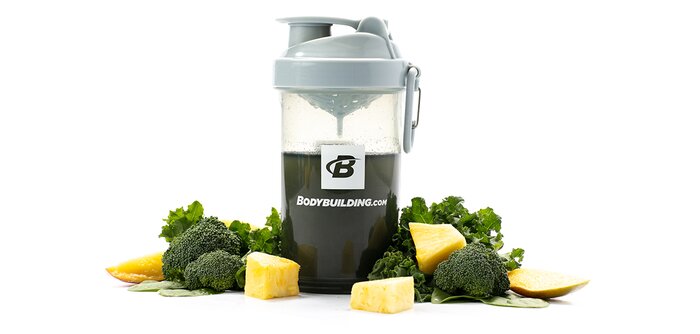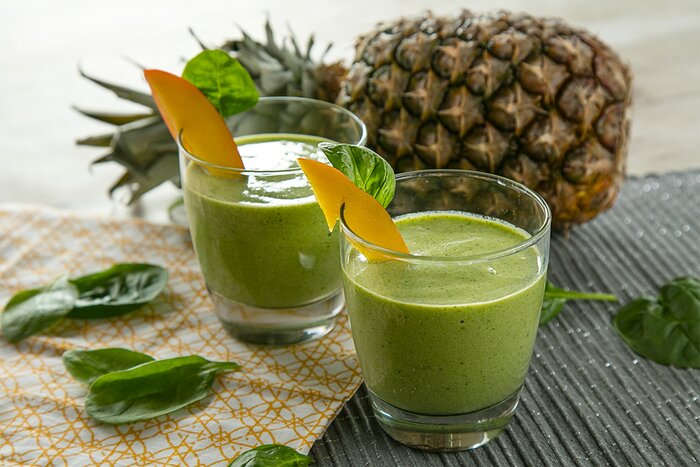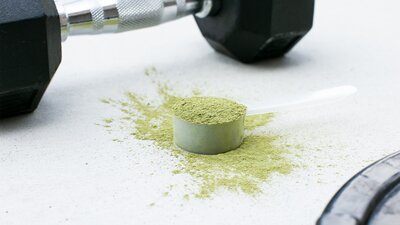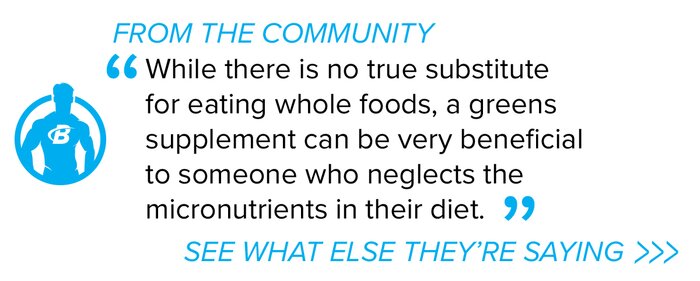Support Your Immune System | Immune-Boosting Supplements | Zinc Guide | Vitamin C Guide | Vitamin D Guide | Greens Supplements Guide
Greens supplements are one of the fastest-growing supplement categories on the market. After all, who wouldn't want a day's worth of fruits and veggies in a scoop or two of powder? These supplements allow you to consume a concentrated version of fruits, vegetables, and herbs, but they're definitely not magical.
Before you surge through the green light, let's go behind the scenes and separate fact from fiction when it comes to everything green.
Q: Can Greens Replace Your Multivitamin?
A: No. Greens supplements might be full of concentrated fruits and vegetables, but most companies don't formulate their products to meet essential vitamin and mineral levels. This is especially true for hard-training lifters who can benefit from an increased intake of minerals like zinc and magnesium.
Plus, as Chris Lockwood, Ph.D., points out in his article, "Ask the Supplement Expert: Should I Drop My Multivitamin If I Use a Superfood," vitamins and greens can be wildly different in the degree to which your body effectively absorbs them.
Even if your greens supplement lists out all the vitamins and minerals it contains in their total amounts—and percentages relative to the recommended daily value—a multi is still a good idea. That's why you'll find both types of supplements on Lockwood's list of Supplements for Every Body.

Q: Can Greens Help Restore Your PH Balance?
A: Possibly. Some people design entire diets solely around optimizing their body's pH, or acid-base balance. This is a little extreme—and is based on fluctuating research—but there is some logic behind it. Grains, dairy, and protein are acidic, while green leafy vegetables are alkaline, or basic. Greens supplements are also alkaline, and one of their purported benefits is their ability to improve your body's acid-base balance.
Some early research indicates they might actually work that way. A study published in the Journal of the International Society of Sports Nutrition found that two weeks of daily supplementation with greens led to significant improvements in urinary pH, moving subjects from an acidic pH to one considered optimal. A later study came to similar conclusions. More research is definitely needed, but the results from this pilot-type study suggest that a daily greens supplement may improve an acid-base balance that is out of the optimal range.
Pop quiz: How many fruits and veggies did you eat today? Probably not enough! Upgrade your breakfast by going green!
Q: Are All Greens Supplements Created Equal?
A: No. Whenever possible, it's important to look for ingredients you can quantify in a greens product. You wouldn't use a creatine supplement without knowing how much creatine was in it, right?
While the dose-to-effect relationship with greens supplements isn't as clearly defined as creatine, it's still important to be as informed as possible. If a greens supplement advertises that it has green tea extract, look to see how much green tea extract the product contains, and compare it to an expert guide explaining the effective dose of green tea.
Don't take everything at face value. The company might just be sprinkling in enough of the supplement to say that it's there instead of adding the amount necessary for you to experience a quantifiable effect.
Q: Does Taking Greens Mean You Don't Need Whole Fruits and Vegetables?
A: No. Greens supplements are not a replacement for eating fruits and vegetables! Honestly, if you're already pounding 10 or more servings of the healthiest fruits and vegetables per day, they're probably unnecessary. The additional antioxidants, phytochemicals, vitamins, and minerals won't provide much more of a benefit compared to the fruits and vegetables you're currently eating.
But let's be honest: You're not.
Particularly if you eat a low-carbohydrate diet or just a small amount of fruits and veggies, then a greens supplement can be a beneficial addition to your supplement regimen.
How to Take a Greens Supplement
Greens supplements vary dramatically in dosages, ingredients, and even scoop sizes, so it's impossible to give an accurate one-size-fits-all dosage recommendation. But it's slightly easier to do so with timing.
The only time to consider skipping greens is immediately after working out. There's actually some research indicating that loading up on antioxidants post-workout can impair your ability to build muscle. So stick to protein then!

That said, greens are an easy way to get a nutritional upgrade any other time of day:
- In your favorite shake or smoothie recipe as a meal replacement
- Mixed into oatmeal or decadent overnight oats with protein, yogurt, and fruit
- Whisked into creamy protein granola
- Blended with kefir as a morning nutrient blast
There are hundreds more shake recipes in the Bodybuilding.com Recipe Database that could serve as a perfect vessel to get more greens in your diet, as well!


